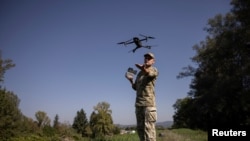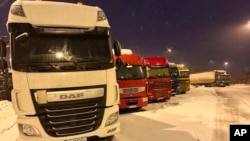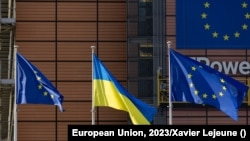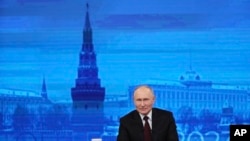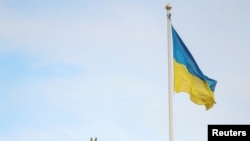Ukraine surprised with its economic progress during the war
[ad_1]
2023, a difficult year for the Ukrainian economy, is coming to an end. Despite the war, the Ukrainian economy began to recover, and international donors note exchange rate and macroeconomic stability. International support for Ukraine, which ensures social payments and the ability of the government to perform its functions, amounted to more than 40 billion dollars in 2023. A similar amount of support is expected next year.
We spoke with Alfred Kemmer, head of the European Department of the International Monetary Fund, about the results of 2023, plans for next year, economic losses from a possible new mobilization, relations between Ukraine and Europe, as well as the Russian economy.
“This year – well done!” – Kemmer about the efforts of the Ukrainian government to ensure the stability of the economy in 2023
Oksana Bedratenko, Voice of America: Ukraine is in a difficult economic situation. Nevertheless, this year it was possible to maintain macroeconomic stability, accumulate currency reserves, and even carry out some reforms. What could the Ukrainian government have done better?
Alfred Kemmer, Director of the European Department of the IMF: First, allow me to sincerely congratulate the Ukrainian government and all authorities on the excellent implementation of the Fund’s program and, in general, the work for macroeconomic, financial stability, and the recovery of economic activity. So, this year – well done! And as you said, reserves are in good shape, growth is faster than we expected, inflation has also slowed more than we expected. These are very important achievements. Indeed, congratulations to the government!
As for what needs to be done, what the government should focus on, particularly next year:
- It is necessary to continue reforms, to keep up the pace of public administration reforms in relation to structural reforms. Why? Because it will attract private investment for recovery and reconstruction. It will also convince donors that the money is well spent on the causes that the donors support, and ultimately it will help Ukraine in its strategic goal of becoming a member of the EU.
- Second, there are challenges to the budget, and the government must continue to implement the budget firmly to ensure the large expenditures required under the current circumstances. It is also necessary to maintain debt stability. How to do it? The National Revenue Strategy needs to be implemented immediately as revenue is needed to support expenditure. Additional steps are likely to be needed to secure revenue for the year and be prepared to do so, as well as borrowing domestically to finance the government.
- And this brings me to the third point: donors should continue their support, funds should arrive on time. The untimely arrival of donor support pushes the government to a suboptimal economic policy and puts all achievements at risk.
OB: Indeed, the IMF continues to finance Ukraine. Recently, a tranche of 900 million dollars arrived. However, there is uncertainty about bilateral aid. How long can Ukraine survive without large aid packages?
A.K.: It is important to provide funds on time. In 2023, donors provided funds on time. This is a great achievement. Regarding the discussions on large aid packages in the US and the EU, I have to say that this is happening within the budget processes, in which certain difficulties can always arise. Both the US administration and the European Union are committed to getting these packages through the budget process and making funds available. It is very important. We also emphasize that allocations must arrive on time.
OB: You mentioned timely help. Will it arrive in time for the first few months of next year?
We expect donor support to arrive in the first quarter
A.K.: Certainly, we expect donor support to come in the first quarter. Also, at the end of the year, the Ukrainian authorities took measures to ensure liquidity buffers. They also monitor the budget very closely in the first few months to avoid problems in case donor funds are delayed.
OB: At his press conference, the President of Ukraine Zelensky mentioned the impact of military spending on the economy. According to him, it takes six taxpayers to finance one serviceman… So is the new mobilization too expensive for Ukraine?
A.K.: We support and monitor the budget as a whole, not individual expenditures, and we and donors help the government of Ukraine during the war to perform basic functions, such as protecting the vulnerable, paying salaries, pensions, paying for education, etc. This is what the 122 billion financing program is aimed at.
OB: But if additional expenses arise because of the war, are donors ready to increase their support even more?
A.K.: I always emphasize very clearly – we expect internal revenue to be generated. Strengthening the economy, structural reforms that support economic activity, better governance will provide additional tax revenues, but in addition, there is a National Revenue Strategy to get more revenue to the budget, to support spending needs during this time. It is also important to build a modern state, and a modern state needs investment. For the private sector in Ukraine, it is necessary to create such an environment that will allow to receive tax revenues and finance expenses.
It may be beneficial for Europe to accept Ukrainian refugees
OB: Europe has announced that it is ready to start negotiations on Ukraine’s membership in the EU. It is hoped that this will open up European markets. At the same time, we see strikes by truck drivers on the border with Ukraine, trade disputes over grain, very high inflation in Europe and have their own problems. Is Europe really ready to open markets?
A.K.: The relationship between the European Union and Ukraine is a relationship of true solidarity not only with regard to aid packages for Ukraine, but also aid to Ukrainians. Europe has opened its borders to trade, and it has also taken in most of the six million refugees, and the financial cost of this is not huge, but it is also not small for the EU as a whole. This is 0.2% of GDP in 2022.
In some countries, such as the Czech Republic, Poland, Estonia, it is more than 1% of GDP in 2022. So Europe is really showing solidarity with Ukraine. But when we open borders to redirect grain exports from the Black Sea to overland routes in Europe, we can expect some problems. There are some groups that are particularly affected by these measures. We need to think about how to solve this problem.
Ukraine’s accession to the EU is a process that will last for many years and will require preparation from both sides – from the Ukrainian side, as well as from the European Union. It will be time for the partners to cope with all the possible consequences of this process
ABOUT.: So when, in your opinion, will Ukraine be able to feel the benefits of rapprochement with Europe?
A.K.: I think that Ukraine already feels the benefits from Europe, because goods go to Europe, Europe welcomes refugees very warmly
The stronger the Ukrainian economy, the greater the benefits from the partnership with the EU
It provides significant financial assistance to Ukraine, and over time the economic benefits of rapprochement with Europe will increase. The stronger the Ukrainian economy, the greater the benefits from this partnership. What is important? Of course, progress in structural reforms must be made to fully reap these benefits, and progress in governance must be made.
OB: Some say that Europe is ready to support Ukraine, but it is tired of supporting Ukrainians. Is it so?
A.K.: I do not see fatigue in Europe from the support of Ukrainians. I see significant efforts to integrate Ukrainian refugees into the labor market. They make up 0.6% of the labor force in Europe, which is not an insignificant number. Yes, there are certain financial costs for supporting refugees. All countries are supportive and some more than others – I mentioned the Czech Republic, Poland and Estonia.
In Poland alone, Ukrainians paid 2.4 billion dollars in taxes, and over time there may be a net positive benefit for the budget from Ukrainian refugees
Support is maintained and these countries will be able to get a net benefit for the budget, because the labor force has been replenished with people who pay taxes. In Poland alone, Ukrainians paid 2.4 billion dollars in taxes, and over time there may be a net positive benefit for the budget from Ukrainian refugees.
It is necessary to do everything for the quick and effective integration of Ukrainian refugees in the labor market, which requires an active labor policy. Because many refugees are women and children. Active childcare policies are needed to attract women to the workforce. The more Europe works on these aspects, the more refugees will join the workforce and, over time, Ukrainian refugees will benefit the labor market in Europe. I must say, of course, that the Ukrainian government hopes that these people will return and participate in the recovery, and for this an economic environment is being created, so that the people who return have prosperity in Ukraine, bring back the skills they acquired in Europe.
And the fact that these connections are being created will, once again, help Ukraine’s strategic goal of joining the EU. This network will help create economic and people-to-people connections, which is as important as economic connections.
OB: There are different views on how the Russian economy is developing. Some say that it is under pressure and turning into an isolated Soviet-style economy. Others argue that Russia has successfully turned to war and is withstanding the sanctions. Who do you think is right?
A.K.: The figures show very clearly that last year we observed a decline in the Russian economy.
But this year we are seeing recovery and growth, largely due to the fiscal stimulus from military spending that has boosted the Russian economy. The transition from external demand to domestic demand contributed to the recovery in Russia. This is in the short term. And in the medium-term perspective, our forecasts for Russia are terrible, because international corporations are leaving Russia, and it is they who are spreading knowledge. Access to advanced technologies is more limited, and the loss of human capital will affect the medium to long term.
Russia was a country with a GDP per capita that approached the GDP levels of Western Europe. This is no longer the case … And this is the price of war
The lack of access to international capital markets is also harmful. Therefore, the medium and long-term horizons for Russia have changed significantly. Russia was a country with a GDP per capita that approached the GDP levels of Western Europe. This is no longer the case. Russia is moving away from this path. This is important and this is the price of war
OB: Does that mean Russians are getting poorer?
A.K.: They are poorer compared to Western Europeans. Previously, their incomes were close to those of Western Europe. We no longer predict that, so they are poorer in relative terms.
The Ukrainian economy will continue to grow, macroeconomic and financial stability will be preserved, Kemmer expects
OB: Another difficult year awaits Ukraine. What will be the biggest challenges?
A.K.: We expect that the Ukrainian economy will continue to grow, and macroeconomic and financial stability will be preserved. We are fully convinced that the government and the National Bank will ensure the result. They are really excellent at conducting economic policy. This will be a key element.
We are also convinced that Ukraine will continue to implement structural reforms that will stimulate economic growth in the medium term, and in the short term – create a favorable environment for private investment. These are important things for next year.
Unfortunately, I must add that there is extreme uncertainty, because of the war, and this uncertainty will remain. However, everyone was surprised at how well Ukraine manages the economy in these conditions of war and what progress has been made in the medium term to strengthen the economy, make it more sustainable and develop prosperity. This is a good start for 2024. The year will be difficult. I’m not saying it’s going to be ordinary, but I have a lot of respect for the partners we support in achieving those goals.
[ad_2]
Original Source Link

